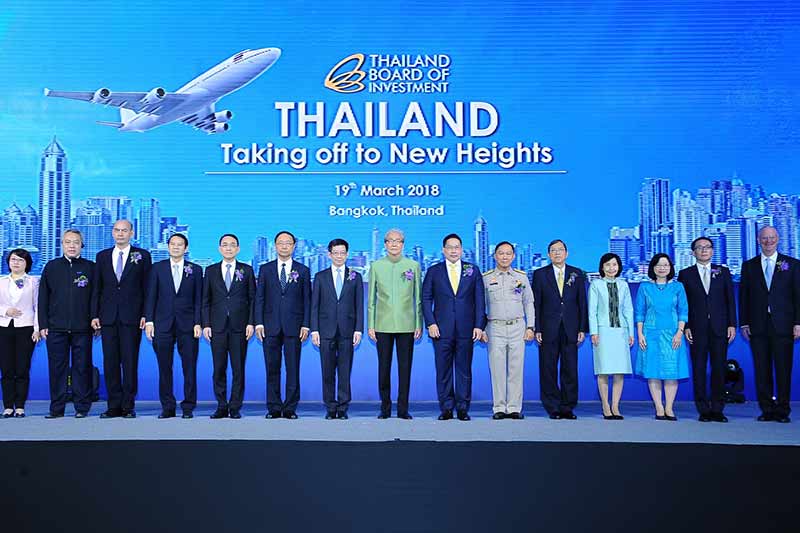
Speaking at the “Thailand Taking off to New Heights” seminar organised
by the Thailand Board of Investment (BOI) yesterday, Thailand’s Deputy Prime
Minister Somkid Jatusripitak talked three strategies – investments in mega projects,
the development of the Eastern Economic Corridor (EEC), and the promotion of digital
technological advances – to transform Thailand’s economy into an engine of
Southeast Asia’s economic growth.
Deputy PM Jatusripitak added that in the past two years the
government has implemented various initiatives resulting driving significant
economic expansion, high export values, more investment applications and
increasing numbers of foreign tourists. He also highlighted improvement in Thailand’s
competitiveness ranking by the International Institute for Management
Development (IMD) and World Economic Forum (WEF). Thailand’s 2017 ranking in the
World Bank’s Ease of Doing
Business improved by 20 positions to the 26th rank in one year. Thailand
was also ranked 1st in US News’ Best Countries to Start a Business
and 8th in US News’ Best Countries to Invest in.
Mr Jatusripitak added the government encourages participation from
members of the private sector, local and foreign, in the implementation of
every project.
Mega projects
This includes development of mega projects to improve physical
infrastructure, such as the electric train system in Bangkok and suburban
areas; new electric trains in other provinces; a dual-track rail system for
enhanced transportation across the country, a high-speed rail system connecting
with neighboring countries; the expansion of Suvarnabhumi Airport phase 2, Don
Mueang International Airport development phase 2, Phuket International Airport
development phase 2, Chiang Mai International Airport development phase 1; as
well as investments in energy surveys and the construction of natural gas
infrastructure and pipelines.
Eastern
Economic Corridor (EEC)
The second key strategy comprises Investments in the EEC
with an aim to create seamless transport and logistic systems linking roads,
rails, sea routes and air transport in the EEC and peripheral areas.
Projects under this strategy to drive Thailand 4.0 [1] policies include the construction of
the Bangkok-Rayong high-speed train system linking three airports, the
improvement of U-Tapao International Airport to make it an aviation hub of the
region; the development of Laem Chabang Deep-Sea Port and Mab Ta Phut Port
Phase 3; and the development of Eastern Economic Corridor of Innovation (EECi).
Digital
advances
This includes projects supporting Thailand 4.0 development such as
investment in village-level broadband internet. The government’s submarine
cable network connecting Thailand, Hong Kong and China is also aimed at making
Thailand an international gateway for this region.
The government supports digital trading and digital transformation
in the manufacturing and service sectors. This has also raised private sector
awareness and enhanced its ability to embrace digital technology faster.
Meanwhile, e-government initiatives have been introduced to increase public
service efficiency.
Kobsak Pootrakool, Minister Attached to the Prime Minister’s
Office, in charge of BOI, said that the Thai government was committed to
economic reform by supporting the adoption of advanced technologies and boosting
innovation. An economic reform scheme has been prepared by the government, encompassing
plans to increase people’s capabilities, to empower the business sector and to
increase efficiency in the public sector. The three major action plans are:
- Increasing
productivity and efficiency in the major industries in which the country has
expertise, strengthening high potential industries of the future, and improving
competitiveness through people development
(There are 10
targeted industries under Thailand 4.0, divided into two segments: 1) First
S-curve or five existing industrial sectors (which can be developed by adding
value through advanced technologies and 2) New S-curve or five sectors which can
serve as growth engines to accelerate Thailand’s future growth)

- Encouraging
partnerships and economic integration in the region, starting from investment
in basic infrastructure, and liberalisation of trade and services, to achieve
sustainable economic growth - Creating
an enabling research and innovation ecosystem by improving measures promoting
the use of innovation in production, which are crucial to increase national
competitiveness
Mr.
Pootrakool emphasised that the realisation of these ambitions will require
close cooperation among a variety of stakeholders.
At
the event, which was attended by over 3,000 participants, including Thai and foreign
investors, representatives from government agencies, and members of the Thai
and international press, a number of key
government agencies held exhibitions and provided up-to-date information to
investors. These agencies included the Industrial Estate Authority of Thailand,
the Eastern Economic Corridor Office (EECO), Ministry of Digital Economy and
Society, and Ministry of Science and Technology, for example.
In
addition, also on display were exhibitions of local products and innovations funded
by government agencies, including the Thailand Research Fund, the Thailand
Institute of Scientific and Technological Research, and the National Research
Council of Thailand.
[1]
Background information on Thailand 4.0
The
Thailand
4.0 strategy aims to help the country escape the middle-income trap,
achieve sustainable growth and reduce income disparities. The Thai Government
is promoting the Eastern Economic Corridor (EEC) development plan as one of the
key measures to realise the Thailand 4.0 vision. The Government is setting
up an Internet of Things (IoT) Institute and a government big data
analytics centre at the EEC. The IoT institute, being set up through
public-private partnership, will be a part of the Digital
Park to be built in Chon Buri province, as a flagship project under
the EEC.
A
Manufacturing Automation and Robotics Academy (MARA) is also being established
at the EEC, to focus on the development of robotics, mechanics, artificial
intelligence and automation and ensure that these technologies play a larger
role in the business and industrial sector.
In
January 2018, Thailand officially
launched a new 4-year professional visa scheme for professionals, also
known as Smart Visa, to attract foreign highly-skilled talents. The Smart Visa
targets foreign entrepreneurs, high-level executives, new business start-ups or
digital independents in 10 target industries.
BOI
has a range of activity-based, technology-based, area-based and merit-based investment
incentive schemes in the EEC. Earlier this year, the Government announced
New Investment Promotion Measures in the EEC—starting January 1, 2018.
















